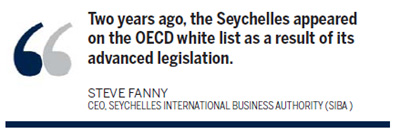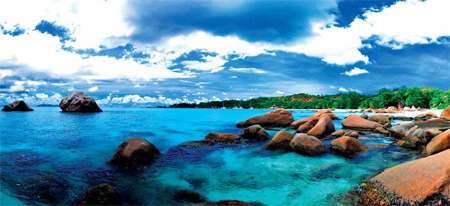News
Financial sector gathers pace with new legislation
(China Daily)
Updated: 2011-03-28 07:59
 |
Large Medium Small |
|
The Seychelles, a "clean" jurisdiction, is keen to dispel the negativity associated with off-shore products. Photos Provided to China Daily |

An increasingly flexible, open business climate is attracting huge investments in banking
Thanks to the International Monetary Fund's extended fund facility and the ensuing fiscal reforms, the Seychelles ran a primary budget surplus of 9.4 percent in 2010.
The government subsequently approved extra spending in 2010 of $6.4 million to boost investment in infrastructure, particularly roads, waste disposal and housing, health and additional debt repayment.
Central Bank Governor Pierre Laporte, who along with the Minister of Finance played a strategic role in implementing macroeconomic stability, noted how the financial landscape is changing.
"In recent weeks, we have been getting interest from companies involved with other activities, such as banking licenses, insurance, leasing and higher purchasing, which is promising. We have just approved a payment system bill and are hoping to bring in more electronic schemes. Some of this will come as the private sector increases its activities and confidence is built.
"The profitability of the banks has been good, which is attractive for those wishing to enter. We need more players to come and create competition, while taking advantage of those higher returns."
With regards to China, the governor says, the Seychelles should be seen as a gateway to the Middle Eastern and African markets.
"We have an intact electricity and communications infrastructure, trilingual people and a literacy rate of more than 95 percent. We have the right time zones, as when Asia is closing, the US and Europe are opening. We can offer a really decent package to potential investors."
In terms of challenges, Laporte said: "I think we can further reduce the time and costs to conduct business and increase the flexibility in the labor laws, and to this end, we have set up a task force, led by the vice-president and the finance minister. To me, it is important to look ahead and see what needs to be done.
"The Seychelles today is a much better place than it was two years ago. People were in a different frame of mind. What the reforms have done is bring the Central Bank closer to the people, and most businesses will tell you they can now do business here."
Steve Fanny, CEO, of the Seychelles International Business Authority (SIBA) agrees. "Two years ago, the Seychelles appeared on the OECD white list as a result of its advanced legislation, which is in adherence with the principles and norms of the OECD's code of practice. We also have secure money laundering standards in place, with the Central Bank regulating business, operators and partners within the industry. This ensures that we carry out diligent checks on the people who invest here."
The challenge, of course, continues to be the bad press that offshore jurisdictions attract due to claims of tax evasion. Fanny maintains, however, that it is a legitmate service with regards to asset protection, raising finance, and wealth maximization.
"It also allows us to lessen our dependence on fisheries and tourism, and has the advantage of not being capital intensive," he said.
"In tourism, you have to inject money, but in the offshore industry, the capital is the person. It is a service industry. It is not capital intensive, and yet the return on your asset is high. Tourism is also a service, but in offshore you can turn over $100 million from a small office."
The Chinese market is being particularly targeted by SIBA for offshore banking; the website is available in Chinese and the organization has taken three road-shows to China geared toward attracting investors, with particular attention given to the benefits of the highly attractive double-taxation agreement.
"We wanted to tell potential investors that you can structure a company in the Seychelles and go to China and get reductions in taxes on dividends on royalties or interests which would make it attractive from an investor's point of view. And then from China in terms of them going to Africa the Seychelles is well poised to offer you that channel to go to Africa."
Diverse portfolio
SIBA is working hard to diversify its portfolio. "We have a new section that will be dealing with mutual funds, hedge funds and securities. The legislation is in place and we have fund managers from the UK setting up offices to represent them in the Seychelles," Fanny explained.
"We will also be launching our stock exchange. There is a lot of activity going on and we will keep looking at our Companies Act to keep it modern and attractive to investors."
Under the International Business Companies Act 1994, non-resident companies do not incur tax while the Special Licence Act 2003 allows companies to be based in the Seychelles with lower taxes but are required to conduct business outside the country and can benefit from the network of double taxation avoidance agreements.
They are liable to the Seychelles business tax rate of 1.5 percent, which can be reduced or avoided where tax credits apply.
Seychelles Foundation Act 2009 allows for the establishment of a foundation, which is not available for public inspection.
International Trusts Act 1994, provides strong asset protection, protecting dispositions to a trust from challenge from the creditors to the settler and also provides exclusion of foreign inheritance laws.
Limited Partnerships Act 2003 facilitates tax-planning opportunities in that income received from sources outside of the Seychelles may be distributed to foreign partners without incurring tax charges. Tax exemption is for 20 years, limited partners are not liable for debts of an LP and at least one general partner must be a Seychellois entity.
Mutual and Hedge Funds Act 2008, tax exempt in the Seychelles, may be administered from abroad.
Securities Act 2007. The Securities Authority administers the licensing, compliance and promotion of the Seychelles as a location for securities dealing; the interests of the investor are paramount, as shown by the rules on the licensing of investment advisers and of securities dealers, but with exemption possible for licensed dealers under recognized overseas authorities who are members of a recognized overseas stock exchange and that of Seychelles.
"The offshore industry depends on what is going on in the global financial community," Fanny concludes.
"But even though we were impacted, we were very resilient during that time. It reduced our output by about 20 percent, but we were cushioned given that all our revenue is derived in dollars.
"The jurisdiction is as good as its people. If you have qualified people it can grow to be a leading financial center. Over the last three years, we have invested heavily in our staff, some of which have been specifically trained in offshore banking. This has been the biggest asset since I have been in SIBA: people have a good understanding of what is going on in the global financial industry."

(China Daily 03/28/2011 page7)
| 分享按钮 |
